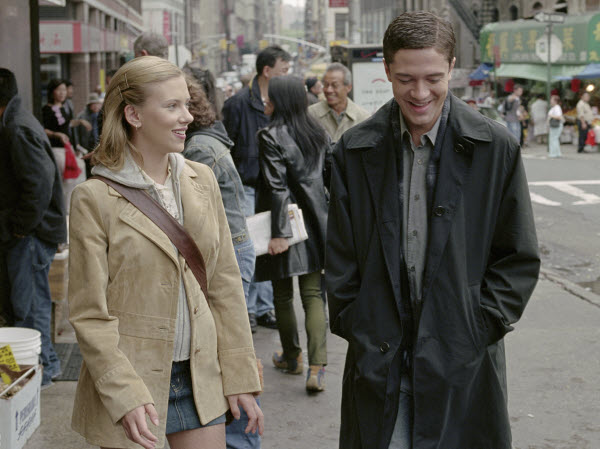Movie review by Greg Carlson
Writer-director Paul Weitz’s “In Good Company” travels some of the same thematic territory as his interesting adaptation of Nick Hornby’s “About a Boy,” which he co-directed with his brother Chris. Shoehorning some terrific acting opportunities into a moth-eaten structure, Weitz explores the relationship of two men most in need of each other. Dennis Quaid plays Dan Foreman, a middle-aged advertising salesman at a popular glossy sports rag. When “Sports America” gets gobbled up by the voracious multimedia giant Globecom, Dan is less than pleased to discover that his new boss is wet-behind-the-ears Carter Duryea (Topher Grace), a kid in his mid-twenties with little experience.
Underneath Carter’s gung-ho determination is a fragile, isolated loner longing for some kind of meaningful human contact. Inviting himself over to Dan’s for dinner following an ill-advised Sunday work session, Carter is immediately attracted to Dan’s college-age daughter Alex (Scarlett Johannson) and his subsequent romantic involvement with her provides the movie with added plot complications. Even more improbable is Dan’s discovery that he is to be a father again, which places greater pressure on him to provide for his family. Toss in the grim layoffs affecting several of his longtime associates, and one begins to understand Dan’s contempt for Carter.
Weitz’s movie is notable more for its delicate comic exchanges between Quaid and Grace than it is for its lackluster affirmations about the pluck of the little guy in a mean, harsh world (the low point is surely a syrupy speech delivered by Dan to Malcolm McDowell’s oily CEO extolling the usual feel-good sentiments about individual value in the bottom-line culture of downsizing and job insecurity). Fortunately, the first two thirds of the movie mostly steer clear of the cliché-ridden caricatures that emerge too often in the last reels. Weitz should have studied Ricky Gervais and Stephen Merchant’s “The Office,” as his own take on workplace politics lacks the cutting intelligence of the celebrated BBC series.
Weitz does, however, leave enough room for his lead actors to fill in the details of their characters, and both Grace and Quaid are tremendously winning. Grace has already proven adept at the transition from small screen to large, making the most of a number of interesting supporting roles. “In Good Company” will surely bring the actor a larger stack of attractive scripts. Grace nails Carter’s hidden vulnerabilities, walking a tightrope between the giddy thrill of landing bigger and better job titles and the outright panic of realizing that you have no idea how to assume all that new responsibility. By all descriptions, Carter should be a colossal jerk, and Grace finds a perfect middle ground between sensitivity and affectation.
Quaid is just as good as Grace, though his role is the less flashy of the two. With well-timed, withering glares at his youthful superior, Quaid earns tremendous sympathy from the audience. The strongest subtextual element of “In Good Company” is its preoccupation with the expectations of American masculinity, and Quaid expertly navigates each of Dan’s humiliating challenges. The actor ably sidesteps several of Weitz’s weakest plot contrivances in order to find the wounded soul in his fading breadwinner. The movie’s resolution might lack some measure of credibility, but Mr. Weitz’s actors most certainly do not.
